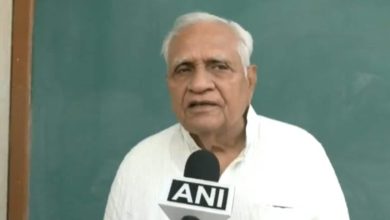Even after five years, Rajkummar Rao and Pankaj Tripathi’s Newton stays as relevant as ever

No matter what side of the political spectrum you are on, there can be no denying that Indian politics is currently in a very strange place. These are times when reality is stranger than fiction. And, in such times, I happened to watch Amit V Masurkar’s political satire Newton for the first time.
Five years have passed since Rajkummar Rao’s film was released in cinemas, but its narrative remains as relevant as ever. It follows a meek, scrawny guy Nutan Kumar, who renames himself as Newton to avoid being laughed at. He lives the simple rule: “If you don’t change nothing, nothing will change.” His idealic approach to life is visible from the word go. He refuses to marry an underage girl for Rs 10 lakh and a motorcycle. He is the only government official who agrees to oversee the smooth functioning of elections in the Naxal-infested jungles of Chhattisgarh. Even during the entire procedure, he goes the book of law and doesn’t like anyone coming in between him and his ideals. However, he is not shown to be a superhero. He is just a law-abiding officer like those you would find around you.
But, just like Newton, these honest and law-abiding officers too become helpless when voters and other forces refuse to cooperate. In this case, Aatma Singh (Pankaj Tripathi), the forest security official, who provides security to Newton and his team. In one of the sequences of the film, while Newton is persent about abiding the rules while setting up the EVM for 76 tribals of the village, Aatma Singh tells him, “Newton ho, Newton hi raho, Einstein mat bano”. At this moment, you may perceive him as the film’s villain as he seemingly impedes fair democratic procedure in order to be able to exit the Naxal region as quickly as possible. However, if you have read about the Naxal assaults in Chattisgarh and the large number of police officers and special operations officers who have been killed in Mao ambushes, you will understand his perspective as well. According to an Indian Express report, 21 security personnel were killed in Naxal attacks in 2019, 36 in 2020, 46 in 2021 and four as of March 21 this year.
So, from a broader viewpoint, Newton is a story about people involved in the country’s electoral process, from election officers and security personnel to voters.
While watching the film, you might also ponder upon the absurdity of holding elections in places where voters hear the name of the candidates for the first time on the day of voting itself. When a compassionate Newton tells tribal villagers they should vote for the one who they think will be beneficial for them, one of them asks, “Who will get us the best price of the Tendu leaves?” Another adds, “What will we get if we cast our vote?” “Will we get paid for voting?”, asks another. It’s a wacky moment in the film, as everyone talks about their vested interests, but it brings out the grim reality of voters in India.
Pankaj Tripathi in Newton.
Newton, in a few instances, also highlights the violence in the region without the use of guns, bombs and landmines. For instance, in the area where Newton and his team put up the electoral booth, there are visuals of burnt houses. A few villagers refuse to vote, because if they will, they will be exterminated the Naxals. The film, keeping away all violence on screen, make the atrocities seem less severe than they really are. We never get to understand what it means to be a group of people who are a part of our country but are ignored for looking and acting differently from the majority.
However, the end, it’s obvious what Newton is really about: How the powerful prey on the weak and the vulnerable, and how democracy has a different meaning for different people.







